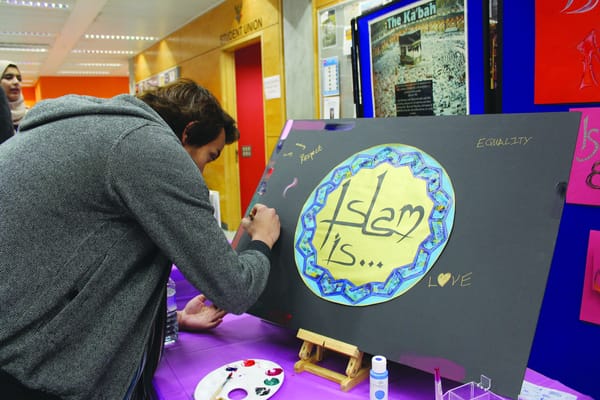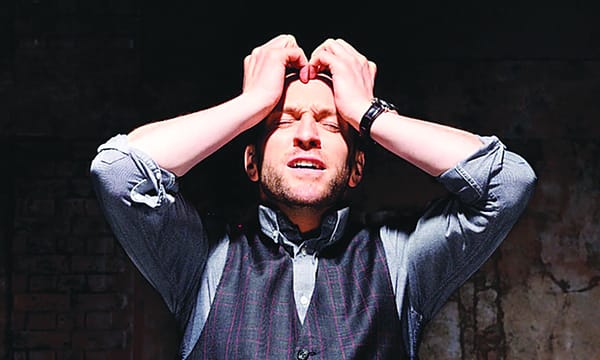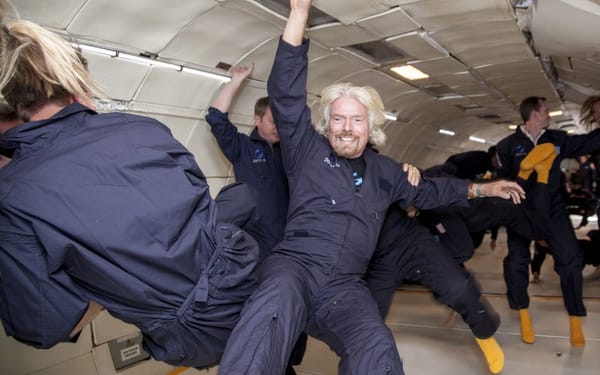“I’d say I lost 90% of my friends circle when I said that I was going to transition”
FELIX interviews 29 year-old Anjeli Patel, who works at Ernst & Young, on being trans, being Indian and the equality in the workplace
Iam ten minutes late by the time I get on the line to Anjeli Patel – not something I reckon would be taken lightly at Ernst & Young LLP, where she works as an associate in assurance within Wealth and Asset management.
Ms Patel was a guest speaker during Imperial’s LGBT+ week, and FELIX took the oppotunity to interview her about her experiences as a trans British Asian woman working in the finance industry.
FELIX: So, I’m not Asian or trans. I know a fair few people at IC who are LGBT+ and have an Asian background. Normally, the first response I got was “Don’t put my name on that!” What would you about this?
Anjeli Patel: As a community we need to be a lot more visible. There are some situations where we just have to be able to talk about this publicly. Unless we do that, we aren’t going to progress society any further. One of the root causes of Indian culture still having such a stigma towards LGBT+ people is due to the way that a lot of families bring up their children. You’re told you’re meant to go to university, get a great job, end up getting married – that’s the template life, and everyone should fit into that template life. It’s almost a situation where you fit the model, or you don’t fit in at all.
I’ve always felt, intrinsically, inside, that I’m female, even prior to any surgery
FELIX: Does coming from a British-Asian family make that harder?
AJ: Definitely. Much of the Indian community struggled when they first came over to the UK. They worked hard. They worked really hard to emerge and be successful – and they want to continue that success. I think there’s an imbalance between wanting your children to be successful, but at the same time, not really allowing them to develop and be their own person. That’s even in a marriage situation – whereby if an Indian person marries outside of their community, outside of a specific caste, or even a specific religion, a situation arises where they almost need to seek the permission of those around them. Rather than appreciating it as two people being in love, it can initially be seen as a challenge by certain members of Indian society.
FELIX: On the other hand, people say: “Right – we’ve got gay marriage. We’ve got equal rights in law. Why are we still talking about this?”
AJ: I think, to be honest with you that the idea of being reluctant to discuss issues stems from shame. That whole idea of brushing it under the carpet stems from shame. You don’t want to talk about the issue: “It doesn’t happen in our backyard – it happens elsewhere”. People still think it doesn’t happen in Asian society. They think it has to do with upbringing, that it’s a ‘western thing’. A lot of Asian people say “we haven’t brought our children up to do that, so it’ll be fine.” There’s this wall of ignorance around the whole topic. Being LGBT+ has nothing to do with upbringing or background or social status or class – it’s got everything to do with the individual. Until people understand that, we have to keep going.
FELIX: But you’d still identify strongly as Indian?
AJ: I do. I think, overall, our culture is great and I am proud to be Indian. We have great literature, we have great cinema, great food. We have a lot to be proud of, and I very strongly identify as Hindu.
FELIX: Sure, the Rigveda says “Vikruti Evam Prakriti” – ”Perversity/diversity is what nature is all about; what seems un-natural is also natural”. Why was that attitude lost?
AJ: Personally, I’m just not sure if Indian society was ever widely accepting of LGBT+ people. Many very modern texts are also supportive, but they just aren’t lived up to. A lot of the stereotypical ideas about what it means to be an Indian person aren’t linked with our faith, they’re not linked with our history – they’re behaviours that have been developed since we arrived here in the UK. It’s our religion that preaches tolerance, acceptance and love. It’s our culture that has distorted itself, through greed, continually seeking material gain and being overly concerned about what others think of us.
FELIX: What does it mean to be female to you?
AJ: It bears no relation with sexuality and is so difficult to articulate. It’s the way I feel in terms of the things that I associate that are feminine. It’s being the one who nurtures relationships slightly more... The traditional stereotypes of what it is to be female are something that I’ve always found attractive. Even if it’s just enjoying certain aspects of makeup, fashion, hair, I’ve always had interests that align me more to what is ‘stereotypically’ female. I’ve always felt, intrinsically, inside, that I’m female, even prior to any surgery.
People still think it doesn’t happen in Asian society
FELIX:But, say I know guys who wear makeup or are into fashion – does that make them, necessarily, feminine?
AJ: It’s so, so much more than that, though I completely understand that men can be into fashion or wear make-up. I was never comfortable... I could never walk into a room dressed as a male before I transitioned and feel comfortable. I would always just want to be in the side of the room, not being noticed, hope no-one would even speak to me. If I reverse the question and ask, other than the fact that you were assigned male at birth, how do you know you’re male? ; It’s a feeling so mentally present but so difficult to capture into words.
FELIX: A number of LGBT+ international students have told FELIX they fear that if they come out, their family will cut them off financially, and they will lose their education. What’s your view on this?
AJ: We have to break this cycle whereby a large proportion of LGBT+ people end up not being able to have a great education for financial reasons. Ideally, Imperial should have some kind of system where they have grants for people who are in this situation (Though, you would need to be careful that those aren’t abused).
FELIX: But should trans people stay as part of LGBT community? Stonewall has only just agreed that it will campaign for trans rights. If someone says “I’m a straight woman now, I don’t need this”, is that right?
AJ: I completely accept that opinon. I understand that Stonewall only recently decided to work with trans people, to help trans people, but for me it’s a sign of progression. The timing is unfortunate – and yes, it is late in the day. But we are very slim on options, to be honest, and I feel that isolating overselves in an already isolated environment isn’t sensible. Stonewall is doing great work right now, and going at it alone with so few public, visible role models – we’d be doing ourselves a huge disservice to do that. Also, for me personally, the gay community has always been incredibly supportive.
FELIX:Imperial College Healthcare Trust is a world leader in gender reassignment surgery. However, it seems that the ICSM doesn’t provide much (if any) training to its students in the field. What would you say about this?
AJ: Treating a transgender person is more than learning about how to complete gender reassignment surgery. You are quite often giving that person their life back. It’s vital that ICSM members are taught the importance and the duty of care they have when dealing with transgender patients. The emotional aspect of support is just as important as the surgical.
FELIX: Was there ever a point where you questioned the transition?
AJ: Yes, there was. Not that I questioned who I was, I questioned the methods that I’d chosen. There were times when I look back and think – I wish I had got a job first, I wish I had secured myself financially before transitioning.
In terms of friends or family, I’d say I lost 90% of my friends circle when I said that I was going to transition. That really made me think, “am I doing the right thing? This is going to continue getting worse.”
But I didn’t really ever question the transition itself because I’d known from a young age that, in my heart, it was the right thing to do.
There were points where I questioned other people, I’d say – about why they would want to treat me so differently when I was still the same person inside. But not really the transition itself, no.
You need to change the culture, not just the rules or the people
FELIX: So you talked about EY – are there still barriers to LBGT+ people in the workplace?
AJ: People in an interview setting want to hire people that almost mirror their own way of thinking. It’s normal human nature to align with people that you have an affinity with. I find that a massive stumbling block in itself. To be honest, I was doing myself a huge disservice. I would prepare for a week, 2 weeks, and then apply to the kind of places where I wasn’t valued. It almost got to the point where I thought, well, I’m not going to continue looking for work. Luckily, I found EY, and they have been fantastic.
FELIX: What’s your general view on positive discrimination?
AJ: I wouldn’t want to be selected to do something just because I was the token trans person or to fill a quota. On the other hand, positive discrimination is needed; the workforce right now is just not representative of society.
FELIX: For example, what’s your position on trans people in sport?
AJ: My opinion is a little controversial. It’s just a personal one, I know there are arguments on both sides. For me, for someone who is born a male to compete alongside other biological females... I completely understand the fact that internally you feel female – obviously I’m going through it myself. However, I also wonder if you are at a physical advantage...and I worry it could, perhaps, make the competition unfair. Obviously, if you can ensure the competition is equal, trans people should absolutely compete alongside their chosen gender.
FELIX: I guess the dream has always been that one day things like Stonewall don’t exist. That this interview isn’t news, that someone can say “I’m a woman” or “I’m gay” and no one cares. Will that day come?
AJ: I hope so. Whether it will actually happen or not, I don’t know. I’m not sure, because of what I’ve been through, it’s not an easy call.
FELIX: Are we getting there?
AJ: I think we’re moving in the right direction, yes. There’s been huge movement in the last year or two. What I fear for trans people at the minute is that it almost seems like you’re acceptable, and you’re fine, so long as visually you fit into what is conventionally male or female. There’s a pressure to be ‘the perfect woman’. My big hope that we start to see more visible trans people outside of entertainment, actually working in government, the corporate sector and within other industries.
FELIX: Imperial says it wants to get more women into STEM. At the moment, we’ve got a ratio of 60:40. How do we make those steps to stop people taking one look and turning away?
AJ: I get what you’re saying about the ratio... but for me, it wasn’t just about the numbers. It was about the way that people treated me. These places felt very oppressively corportate – more like an old boy’s club than anything else. There was very little passion there, very little understanding. You need to change the culture, not just the rules or the people.








